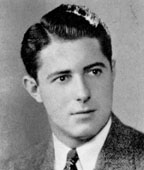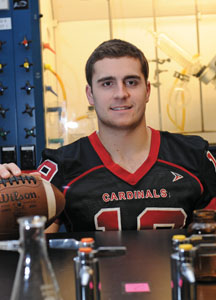PLANNED GIFTS: CREATING A LEGACY

Like the sound of the South College bells echoing down the years, gifts to Wesleyan of all sizes have a lasting impact; planned giving is especially meaningful to the university. These gifts can also help donors accomplish both retirement and philanthropic goals.
Dave Knapp ’49 knows this well. He has donated a portion of his assets, including his Connecticut home, to Wesleyan following his death.
The retired sales executive, who has had a second career as a social activist fighting for LGBT rights, also gives currently, having established an endowed scholarship in 2003. The fund provides scholarship support annually, and since it is endowed, there will be a Knapp Scholar at Wesleyan in perpetuity. His significant documented bequest intention will be allocated to his fund.
“It’s important to make sure someone else has a chance to have a Wesleyan education,” he said. “I’ve really enjoyed getting to know some of the students. I like knowing more will benefit in the future.”
Mark Davis ’96, director of gift planning at Wesleyan, said contributions like Knapp’s can be valuable to the donor as they benefit the university.
“Gifts like these allow alumni and friends to have a greater impact on Wesleyan than they could have imagined,” Davis said. “This support can be a key part of their retirement and tax planning process.”
For example, charitable remainder trusts and annuities are powerful vehicles that provide consistent, tax-advantaged payments to the donor and beneficiaries, with the principal going to the university when the beneficiaries pass away. In 2009 Wesleyan hired the premier firm Kaspick & Company, a subsidiary of TIAA-CREF, to manage the investment and administration of such gifts for Wesleyan.
The late Lewis Andrews ’39 and his wife, Helga, were consistent donors to Wesleyan through the years. They established two charitable remainder trusts to create a scholarship fund and also designated a significant bequest to benefit the scholarship, which is named after Lew.
At Wesleyan, he once said, he was presented with “the challenge to think, analyze; the ability to separate the important from the inconsequential. It was a base from which I could master any other problem.”
Mr. Andrews, who was in the map printing business, was also an author. He wrote Tempest, Fire and Foe: Destroyer Escorts in World War II and the Men Who Manned Them (Narwhal Press, 1999), a historical look at destroyer-escort ships and their role during the war. Mr. Andrews spent eight years researching these ships and their crews.
The Andrews’ generosity was not purely monetary. The Wesleyan University Press will receive the publishing rights to several books written by Helga Andrews’ first husband.
Davis said other types of bequests, of real property or insurance, can be good options for alumni who want to make lasting gifts. Gifts of such property during one’s lifetime have the potential to unlock payments from a particular asset.
“The value of the bequest is creating a legacy,” he said.
“People often have more to give through their estate than they do otherwise.”
Planned giving amounts, on average, to about 10 percent of Wesleyan’s fundraising, and “almost all of this support goes to the endowment for financial aid,” Davis said. “I have the privilege of working with many donors who benefited from Wesleyan’s generous financial aid while they were students. These individuals are now in a position to acknowledge this support through a legacy of their life’s work. I enjoy helping them develop the plan that best suits their needs and objectives.”
For more information on how gifts to Wesleyan can be part of your retirement and philanthropic planning, go to: wesleyan.plannedgiving.org/.

